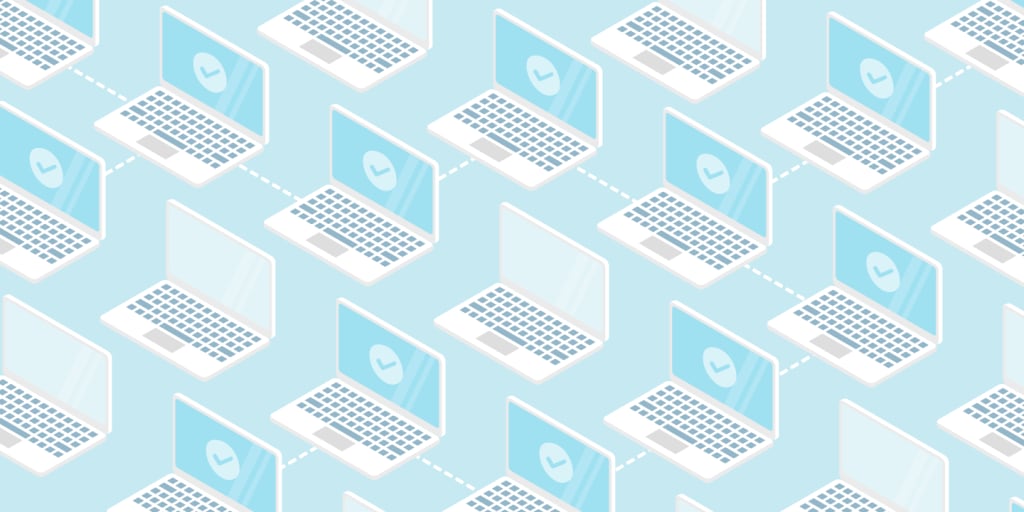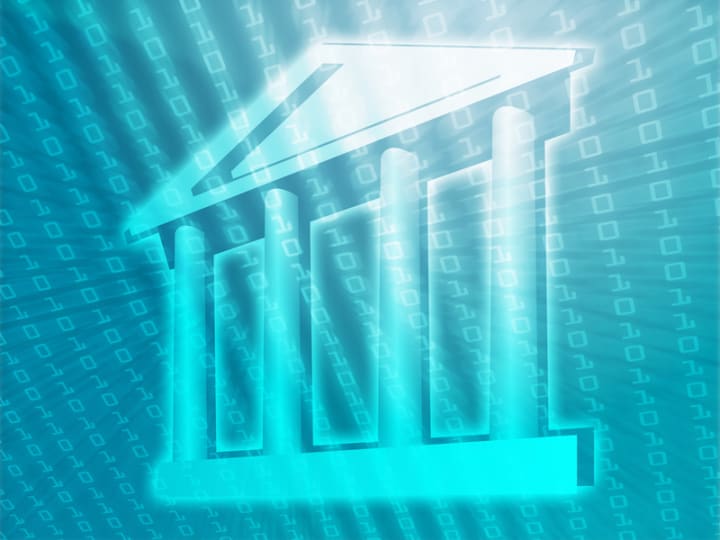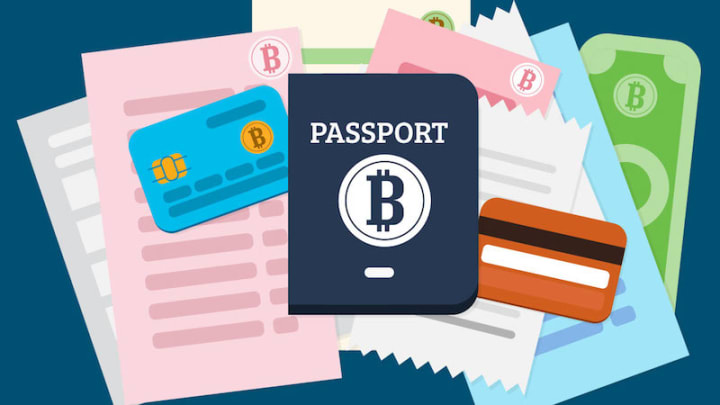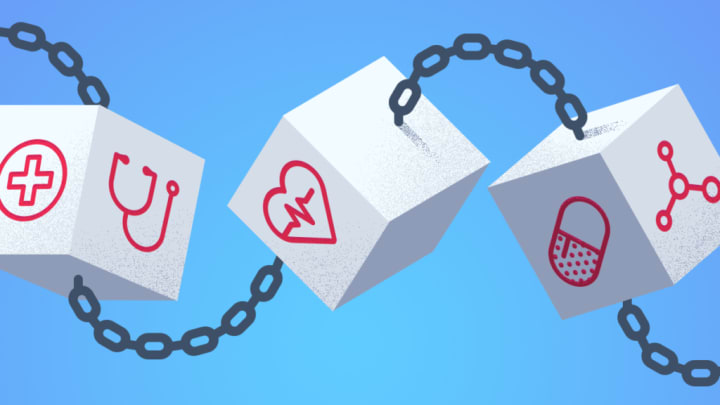Industries That Are Nailing Blockchain Already
These ten industries that are nailing blockchain are setting the example for many industries to incorporate the technologies that support growth and advancement.

From the retail industry to healthcare, each of these industries are catching on to the incredible advancements that blockchain has to offer to our industries as a digital ledger, or record keeper, for transactions. From improving transparency to reducing costs, blockchain will open opportunities to some of the most powerful industries in the world.
These industries that are nailing blockchain not only are incorporating the technologies that support growth and advancement, but setting an example for industries to come.
Government

To start off our list of the industries that are nailing blockchain, government organizations are using blockchain to gain trust. It is believed that the use of blockchain, as well as Bitcoin, DLT, and cryptocurrencies, will transform how the government will interact with its future constituents.
With blockchain, the government's role has transformed, as a way to adapt to the new technologies that are now accessible. This includes government efficiency, global leadership, and industry creation. Governments and individuals alike can now transfer funds without any administrative holding time or fee.
They now have the ability to allow users to record transaction and data, without the factor of being hackable, using the unbreakable chain that is encrypted in a way that cannot be deleted or altered. It can also be used to ensure government documents are identical, a solution to many hours of work.
Food
Blockchain truly has the ability to revolutionize the food industry. Next on our list of the industries that are nailing blockchain, the food industry is quickly using blockchain to transform food companies.
By using blockchain to store food supply chain data, the food industry will now have access to enhanced traceability, not only of product origin but storage temperatures, shipping, batching, the list goes on.
Using blockchain will allow food companies to trace processing, expiration, where the livestock was harvested, and much more, all with real-time information. This will allow the industry to advance drastically, as the way that sharing information is transformed.
This will also increase food safety, and will allow for better responsibility. This will limit outbreaks of disease and contamination, as well as save lives. Plus, blockchain can be used to prevent fraud in the food industry, as it will facilitate data-sharing that can be traceable.
Insurance
As a potential change in the way that insurance companies share data, the insurance industry has been implementing these blockchain technologies to transform the way that we process claims and prevent fraud.
And as one of the industries that are nailing blockchain, insurance companies are improving trust with their clients with the use of these technologies. In our current crisis of trust, blockchain will enhance efficiencies, improve claims, incorporate smart contracts, and increase fraud detection.
The way that this will enhance efficiencies is that blockchain will allow personal data to be accessed by an individual that is registered with blockchain with verification. For example, Tradle is using blockchain to develop KYC data, in order to have it verified and forwarded to other companies, without repeating the data entry. Blockchain can improve claims by using smart contracts.
Smart contracts are the solution to many problems in the insurance industry, and it will allow you to record and verify contracts on the blockchain as well as ensure that only valid claims are paid.
And finally, increasing fraud detection and prevention is now accessible. Due to the ability to detect fraudulent activity, this is reason alone for insurance companies to incorporate blockchain technologies into their businesses. This will increase validation and independent verification of customer, transactions, and policies.
Education
There are plenty of great ways that the education industry is using blockchain to advance. This includes E-portfolios, blockchain certifications, and cryptocurrency payments.
Using payments via cryptocurrency is a great way that some universities have begun to accept for tuition fees. Some of those universities include the University of Nicosia, Simon Fraser University, and King’s College.
As a way to eliminate the necessity of requesting confirmation of the credentials of a diploma, blockchain certifications are a great alternative route the education industry can use. This will eliminate the need for operational servicing power that is required to verify a diploma or other graduates' certifications.
E-portfolios are being used as platforms that will hold all records of education, in a decentralized format. This can include certifications, records, attendance, transcripts, résumés, etc. This would even cut down on cost as well as paperwork, making the education system more efficient.
Travel

Blockchain technology has the potential to dominate the travel industry, providing benefits of savings. This goes for destinations, data, payments settlement, vacation rentals, and much more.
Payment settlements will be affected by blockchain because of the use of a single and secure global ledger offered by Blockchain, which will reduce airline costs as well as hotels and travel agencies. This is done by streamlining settlements and bank payments.
Destinations will be affected by blockchain for many reasons. Dubai is in the process of becoming the blockchain capital of the world, by working with Loyyal. The two will work together to create an incentive visitor behavior. This will help visitors to discover new places in return for a reward of loyalty points.
Aruba is also working with blockchain, specifically the startup, Winding Tree. They are looking to connect tourists with suppliers for travel using the Ethereum platform.
And finally, data will be affected by blockchain technologies because of the fact that TUI, the world's largest tourism company, will soon move all of its data to the blockchain. This includes using blockchain to travel contracts internally using BedSwap.
Legal
Next on our list of the industries that are nailing blockchain is the legal industry. With the potential to drive this industry forward, blockchain is being used in many ways to improve the processes of the legal industry, many of the improvements including trust. The first way blockchain can aid in legal companies is the make the business safer.
This can be done by securing digital transactions and integrating within security protocols that are already existing. This will decrease cybersecurity risks. Blockchain will also eliminate human error, creating more accuracy of data as well as consistency.
It will also enhance service availability and transaction speed within law firms. Security will also be advanced as well as easier sharing of documents.
Energy
Yet another one of the industries that are nailing blockchain is the energy industry. How is blockchain changing this industry? In short, it is speeding up the industry's processes. And to do so, the industry is enabling a new method for keeping track of the clean energy and how much is produced.
The governments have created a system to track this based on tradable certificates, but this has its flaws. So with the use of blockchain, the energy industry will now be able to generate a logged spreadsheet with zero human error, which will be entered into a system to create a verified certificate.
Retail
Another industry to incorporate blockchain is the retail industry. Peer to peer marketplaces can track peer to peer retail transactions. This opens up product information sharing such as shipment and bills.
Plus, it allows access to payments via Bitcoin. With blockchain in the retail industry, this will open up an opportunity for transparency, reducing counterfeit, and improving shipment.
Transparency increases the importance of the customer. This can be seen through Provenance, a platform that will help brands in the retail world provide more transparency through blockchain.
It will allow customers to trace where their products come from as well as verify the authenticity of their clothing and materials. Blockchain will increase transparency in all of the aspects of retail, with the supplier, the retailer, the end consumer, and the manufacturer.
Blockchain will also reduce counterfeit goods. This can be done by using Block Verify, which will provide a solution for counterfeit luxury items, electronics, pharmaceuticals, and even diamonds.
Blockchain will also open the opportunity to improve shipment. This can be done with Wave, a global supply chain, which is used to modernize bills of lading through a peer to peer network. This will connect the members of the supply chain to exchange documents and to decentralize the process.
Healthcare

The healthcare industry can be transformed by blockchain due to drug development, medical research, data security, and billing and claims management.
Blockchain can aid in drug development because patient results will be much more accessible with its technologies. This can also reduce counterfeit drugs and cut cost for pharmaceutical companies.
Medical research will be transformed by blockchain due to the incorporation of new treatment protocols. This will improve both care and patient success. This will eliminate the human processing of data, and rather generate the recorded information in systems for future treatment.
And finally, billing and claims management will be changed due to the elimination of medicare fraud. Blockchain systems can help minimize this issue, as well as reduce admin costs.
Supply Chain
Last on our list of the industries that are nailing blockchain is the supply chain industry. Again, this industry can benefit greatly from blockchain, and has proven so with its slow start to incorporating the blockchain technologies.
Blockchain will allow the supply chain to eliminate human error, fraud, minimize courier costs, reduce delays, increase transparency with the consumers, increase the speed of paperwork, improve inventory management, and identify issues faster.
About the Creator
April Demarco
Proud mom of three chinchillas, hard core Justin Bieber fan, watches Unsolved Murders religiously







Comments
There are no comments for this story
Be the first to respond and start the conversation.